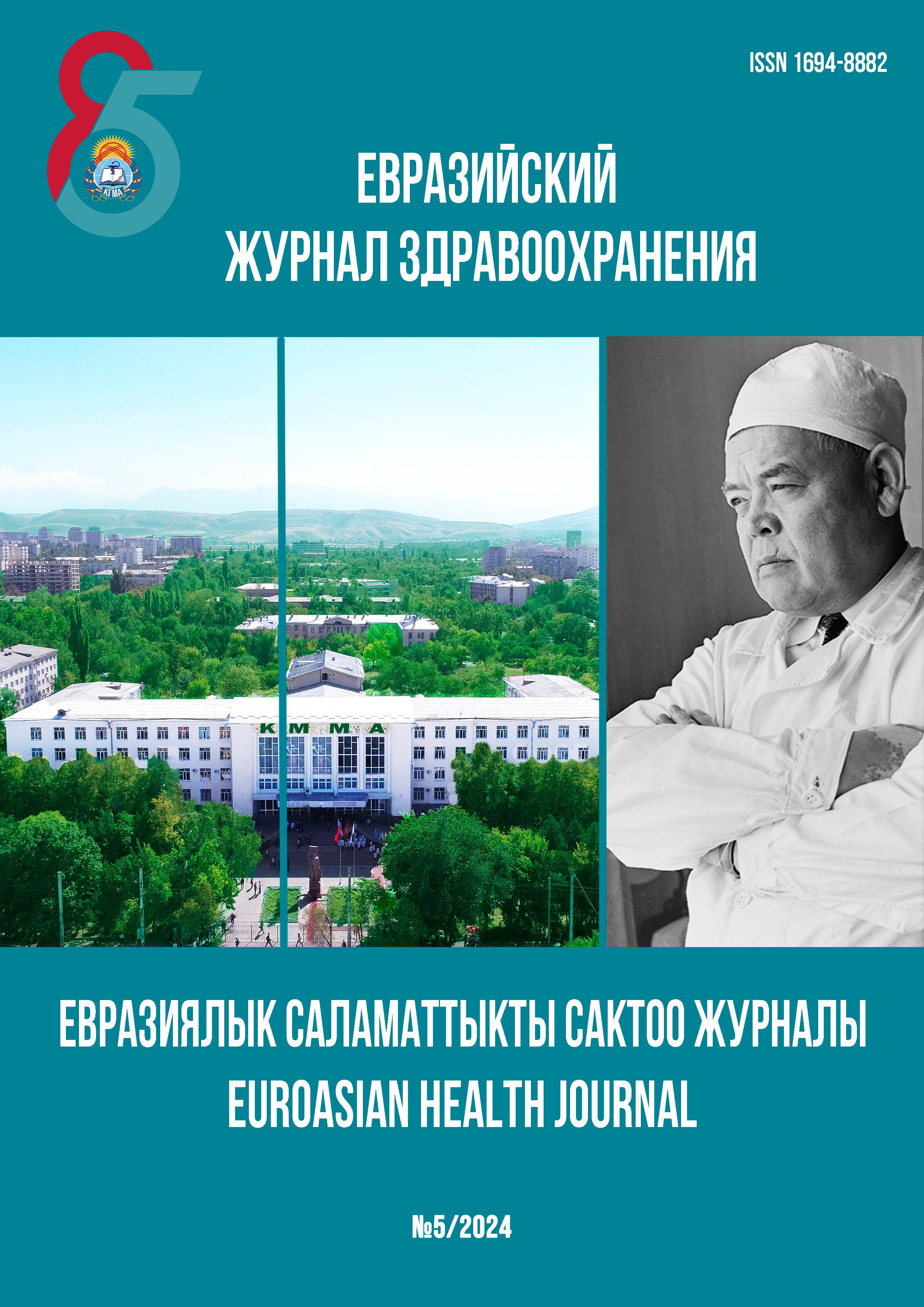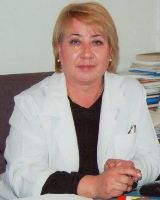STATUS AND PROSPECTS OF DEVELOPMENT MEDICAL EDUCATION IN KYRGYZSTAN
DOI:
https://doi.org/10.54890/1694-8882-2024-5-15Abstract
The state and prospects for the development of medical education in our country remain an important topic for discussion, especially in the context of rapidly developing technologies and innovations in medicine. Modern medical personnel must have not only basic knowledge, but also be able to apply advanced diagnostic and treatment methods, use high-tech equipment, and work effectively in the context of digitalization of healthcare. This requires regular updating of educational programs and competencies, especially at the postgraduate level. Retraining and advanced training of specialists should take into account the latest advances in medicine, as well as the introduction of new educational technologies, such as simulation trainers and online courses. It is important that medical training programmes reflect current healthcare needs, promoting the development of an interdisciplinary approach and improving the quality of medical services in the country. Objective: to analyze the current situation and development opportunities of postgraduate education in the Kyrgyz Republic. Research methods. This article is devoted to a review of the literature on the problems of development at the postgraduate level of education, where the main directions of medical education, the study of foreign experience, based on the analyzed literature are considered. This study describes the state and prospects for the development of medical education in Kyrgyzstan, using a diverse set of methods, including: thematic research methodology and comparative method.
Keywords:
health care system, medical academy, postgraduate medical education, competence and competence-based approach in educationReferences
1. Гохберг Л.М., Огородова Л.М., ред. Прогноз научно-технологического развития России: 2030. Медицина и здравоохранение. Москва: Министерство образования и науки Российской Федерации, Национальный исследовательский университет «Высшая школа экономики»; 2014. 48 с.
2. Пристром М.С., Пристром С.Л., Семененков И.И. Старение физиологическое и преждевременное. Современный взгляд на проблему. Медицинский туризм. СПА. Антивозрастная медицина. 2017;5-6:40-63.
3. Руженков В.А., Лукьянцева И.С., Руженкова В.В. Аддиктивное поведение студенческой молодежи: систематика, распространенность, клиника и профилактика. Серия Медицина. Фармация. 2015;30(10(207)):13-25.
4. Barzansky B, Hunt D, Moineau G, Ahn D, Lai CW, Humphrey H, et al. Continuous quality improvement in an accreditation system for undergraduate medical education: Benefits and challenges. Med Teach. 2015;37(11):1032-1038. https://doi.org/10.3109/0142159X.2015.1031735
5. Power B. Artificial Intelligence Is Almost Ready for Business. Harvard Business Review: [Electronic resource]. 2015. Available from: https://hbr.org/2015/03/ artificial-intelligence-is-almost-ready-for-business.
6. Basu K, Sinha R, Ong A, Basu T. Artificial Intelligence: How is It Changing Medical Sciences and Its Future? Indian J Dermatol. 2020;65(5):365-370. https://doi.org/10.4103/ijd.IJD_421_20
7. Gasser U, Ienca M, Scheibner J, Sleigh J, Vayena E. Digital tools against COVID-19: Taxonomy, ethical challenges, and navigation aid. Lancet Digit Health. 2020;2(8): e425–434. https://doi.org/10.1016/S2589-7500(20)30137-0
8. Schwalbe N, Wahl B. Artificial intelligence and the future of global health. Lancet. 2020;395:1579–1586. https://doi.org/10.1016/S0140-6736(20)30226-9
9. Lucas GM, Gratch J, King A, Morency LP. It’s only a computer: Virtual humans increase willingness to disclose. Computers in Human Behavior. 2014;37:94-100.
10. Jain A, Bansal R. Applications of regenerative medicine in organ transplantation. J Pharm Bioallied Sci. 2015;7(3):188-194. https://doi.org/10.4103/0975-7406.160013
11. Давыдов А.П. Современные междисциплинарные медицинские специальности. Бюллетень медицинских Интернет-конференций. 2013;3(11):1237.
12. Кривенко Н.В., Куклин А.А., Аверьянов О.Ю. Междисциплинарность в здравоохранении: вклад в обеспечение социально-демографической безопасности региона. Известия Уральского государственного экономического университета. 2017;6(74):5-20.
13. Альтбах Ф.Дж., Салми Д. Дорога к академическому совершенству: Становление исследовательских университетов мирового класса, пер. с англ. М.:Весь Мир; 2012. 416 с.
14. Чернышева Т.М Инновационные технологии в последипломном образовании. Вестник Университета. 2015;7:276-279.
15. Тодис Л.М., Виноградова Т.В., Андронычева А.С. Современные проблемы высшего образования в России и возможные пути их решения.Современное педагогическое образование. 2023;3:78-80.
16. Абаскалова Н.П. Формирование компетенций в области здоровья сбережения в профессиональном образовании на уровне бакалавриата и магистратуры. Научные ведомости Белгородского государственного университета. Серия Гуманитарные науки. 2018;37(3):489–496.
17. Быкова Р.А. Развитие компетентностного подхода в процессе профессиональной подготовки в высшей школе. Вестник Санкт-Петербургского университета МВД России. 2016;4(72):158-163.
18. Lytras MD, De Pablos PO, Avison D, Sipior J, Jin Q, Leal W, at al. Technology Enhanced Learning: Quality of Teaching and Educational Reform: 1st International Conference. TECH-EDUCATION 2010, Athens, Greece, May 19-21, 2010. Berlin: Springer Science & Business Media. 2010. 504 p.
19. Слепцова А.Е., Баишева А.Е. О сущности и содержании понятий «компетенция» и «компетентность». Современные тенденции развития системы образования: сборник статей – Чебоксары: Среда; 2018:72-75.
20. Петренко А.А., Хомутов А.Ю. Компоненты профессиональной компетентности будущего учителя истории. В кн.: Мурзина Ж.В., ред. Актуальные вопросы гуманитарных и социальных наук: от теории к практике: материалы II Всерос. науч.-практ. конф. с междунар. участ. Чебоксары, 5 июня 2023 г. Чебоксары: Среда; 2023:74-75.
21. Shah N, Desai C, Jorwekar G, Badyal D, Singh T. Competency-based medical education: An overview and application in pharmacology. Indian J Pharmacol. 2016;48(Suppl 1):S5-S9. https://doi.org/10.4103/0253-7613.193312
22. Brightwell A, Grant J. Competency-based training: who benefits? Postgrad Med J. 2013;89(1048):107-110. https://doi.org/10.1136/postgradmedj-2012-130881
23. Frank JR, Snell LS, Cate OT, Holmboe ES, Carraccio C, Swing SR, et al. Competency-based medical education: Theory to practice. Med Teach. 2010;32:638–645.
24. Дудаев Г.С-Х. Компетентностный подход в образовании: проблемы и пути решения. Вопросы образования: от теории к практике: Материалы I Международной научно-практической конференции. М.:Перо;2015:20-22.
25. Шапошников В.И., Ашхамаф М.Х., Гедзюн Р.В., Марченко Н.В. Проблемы современного медицинского образования. International Journal of Experimental Education.2012;4:272-274.
26. Шаталов М.А. Методология отбора и структурирования содержания учебных курсов. International Journal of Experimental Education. 2012;4:274-276.
27. Чоюбекова Г.А., Садамкулова К.И. Подготовка и востребованность медицинских кадров в Кыргызской Республике: состояние и критический анализ. Вестник КГМА им. И.К. Ахунбаева. 2019;5-6:37-42.
28. Сериков В.В. Идеи психологии в образовательной теории и практике: личностно-развивающее образование. Психология образования в XXI веке: теория и практика: материалы конференции [электронный ресурс]. Волгоград: ВГПУ; 2011. Режим доступа: https://psyjournals.ru/nonserialpublications/education21/contents/54104. (дата обращения: 14.10.2023)
29. de Boer H, Timmermans AC, van der Werf MPC. The effects of teacher expectation interventions on teachers’ expectations and student achievement: narrative review and meta-analysis. Educational Research and Evaluation. 2018;24(3–5):180–200. https://doi.org/10.1080/13803611.2018.1550834
30. Гончар Н.Т. Научное обоснование совершенствования системы последипломного медицинского образования в Северо-Западном федеральном округе Российской Федерации [Автореферат дисс.]. СПб; 2012. 42 с.
31. Леонтьева О.Н., Иваницкая И.П. Актуальные проблемы современной системы образования. Научный лидер. 2022;44(89):31-32.
32. Мурзалиева Г., Торобаева А., Темиров А., Карипова А. Оценка последипломного и непрерывного медицинского образования в Кыргызской Республике. Бишкек: Общественный Фонд «Центр анализа политики здравоохранения»; 2013. 34 с.
33. Постригач Н.О. Модернизационные аспекты повышения квалификации педагогов в Южной Европе и Украине. Научное обеспечение системы повышения квалификации кадров. 2016;3(28):31-39.
34. Akdemir N, Lombarts KMJMH, Paternotte E, Schreuder B, Scheele F. How changing quality management influenced PGME accreditation: a focus on decentralization and quality improvement. BMC Med Educ. 2017;17(1):98. https://doi.org/10.1186/s12909-017-0937-9
35. Boulet J, Zanten M. Ensuring high quality patient care: the role of accreditation, licensure, specialty certification and revalidation in medicine. Med Educ. 2014;48(1):75–86.
36. Lypson ML, Prince MEP, Kasten SJ, Osborne NH, Cohan RH, Kowalenko T, et al. Optimizing the post-graduate institutional program evaluation process. BMC Medical Education. 2016;16:65. https://doi.org/10.1186/s12909-016-0586-4
37. van Zanten М, Boulet JR, Greaves I. The importance of medical education accreditation standards. Medical Teacher. 2012;34(2):136–45.
38. Braithwaite J. Restorative justice and responsive regulation: the question of evidence. Canberra, Australia: School of Regulation and Global Governance (RegNet); 2016. 32 p. Available from:https://johnbraithwaite.com/wpcontent/uploads /2016/10/SSRN_2016_BraithwaiteJ-revised-51.pdf
39. Feld LP, Frey BS. Tax compliance as the result of a psychological tax contract: the role of incentives and responsive regulation. Law & Policy. 2007;29(1):102–20.
40. Brehm SS, Brehm JW. Psychological reactance: a theory of freedom and control. Academic Press; 2013. 446 p.







